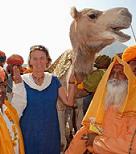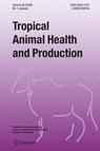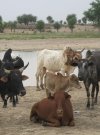Vier Hände für einen Höcker / Four hands for one hump

This article (in German) in the July 2009 issue of the nature magazine Natur+Kosmos describes the work of LPP’s Ilse Koehler-Rollefson and Hanwant Singh Rathore, director of LPP’s partner organization in Rajasthan, Lokhit Pashu-Palak Sansthan.
Local breeds, livelihoods and livestock keepers’ rights in South Asia

Ilse Köhler-Rollefson, H. S. Rathore and E. Mathias. Tropical Animal Health and Production. 22 Nov 2008.
Abstract
In South Asia, and throughout the developing world, the predominant official approach to livestock development has been improvement of production by means of upgrading local breeds via cross-breeding with exotic animals. This strategy has led to the replacement and dilution of locally adapted breeds with non-native ones. This has resulted in an alarming loss that has been estimated by the Food and Agriculture Organization of the United Nations to amount to one breed every two weeks. Based on selected case studies this paper argues that development strategies using locally adapted breeds and species are much more likely to benefit livestock keepers whilst also maintaining domestic animal diversity and bearing a smaller ecological footprint. It also analyses the rationale for “Livestock Keepers’ Rights”, a principle that grew out of the struggle of traditional livestock keepers to retain control over their production resources, such as grazing areas and breeding stock, in the face of unfavourable policy environments.
Draft version (93 kb)
FAO highlights role of livestock keepers in breeds

The Food and Agriculture Organization of the United Nations has recognized the contribution of smallholders and pastoralists to the development, use and conservation of animal genetic resources.
FAO’s Commission on Genetic Resources for Food and Agriculture presented a 42-page paper detailing the role of livestock keepers in developing and maintaining breeds at an intergovernmental working group on animal genetic resources in Rome on 28-30 January 2009.
The paper highlights the value of these breeds, the genes they contain and the ecosystem services they provide (such as maintaining landscapes, preventing fires and restoring soil fertility). It warns about the dangers to local breeds from the promotion on exotic breeds, the spread of uniform, mass-marketed animal products, and the extension of cropping into marginal grasslands.
The League welcomes FAO’s support of these ideas, which have long been promoted by LPP and the LIFE network.
Click here to download the full paper.
- Go to the previous page
- 1
- …
- 44
- 45
- 46
- 47
- 48
- 49
- 50
- …
- 76
- Go to the next page
